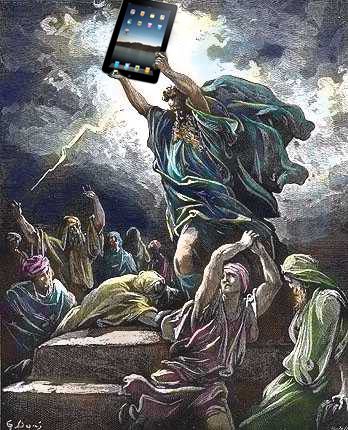Neodicy
Warren Ellis did me the great honor of asking me to write a piece for his website, on whatever topic was on my mind. This is what resulted. You can see the posting at Warren's place here; I've reproduced it below for my archives.
 Technology will save us. Technology will destroy us.
Technology will save us. Technology will destroy us.
The Future will save us. The Future will destroy us.
The tension between the myriad ways our tools — our technologies — affect us is often at the core of futurological discussions. Do they weaken us, destroying our memories (as Socrates argued) or our ability to think deeply (as Nicholas Carr argues), or do they enhance us? Do our technologies rob us of our humanity, or are they what make us human? While I tend to bias towards the latter view, it's not without recognition that our tools (and how we use them) can damage our planet and our civilization. But for a surprisingly large number of people, such discussions of technology aren't just part of futurism, they are futurism. From this perspective, the question of whether our technologies will destroy us is essentially the same as asking if our futures will destroy us.
This deep fear that what we have built will both give us heretofore unimagined power and ultimately lay us to waste has been with us for centuries, from the story of Icarus to the story of Frankenstein to the story of the Singularity. But because of its mythical roots, few foresight professionals give this fear sufficient credence. Not in the particulars of each story (I don't think we have much cause to worry about the risks associated with wax-and-feather personal flight), but in the recognition that for many people, a desire to embrace "the future" is entangled with a real, visceral fear of what the future holds for us.
In religious study, an explanation of how an all-powerful deity that claims to love us can allow evil is known as a "theodicy." The term was coined in 1710 by Gottfried Liebniz -- a German natural philosopher who, among his many inventions and ideas, came up with calculus (independently of Newton, who is usually credited) and the binary number system. A theodicy is not merely a "mysterious ways" or "free will" defense, it's an attempt to craft a consistent plausible justification for evil in a universe created by an intrinsically good deity. Theodicies are inherently controversial; some philosophers claim that without full knowledge of good, no theodicy can be sufficient. Nonetheless, theodicies have allowed believers to think through and discuss in relatively sophisticated ways the existence of evil.
The practice of foresight needs within its philosophical underpinnings a similar discourse that treats the fear of dangerous outcomes as a real and meaningful concern, one that can neither be waved away as pessimism nor treated as the sole truth — a "neodicy," if you will. Neodicies would grapple with the very real question of how we can justifiably believe in better futures while still acknowledging the risks that will inevitably arise as our futures unfold. Such a discourse may even allow the rehabilitation of the concept of progress, the idea that as a civilization we do learn from our mistakes, and have the capacity to make our futures better than our past.
For those outside the practice of futurism, neodicies could be sources of comfort, allowing a measure of grace and calm within a dynamic and turbulent environment; neodicies give future dangers meaningful context. For futurists, the construction of neodicies would demand that we base our forecasts in more than just passing trends and a desire to catch the Next Big Thing; neodicies require complexity. For all of us, neodicies would force an abandonment of both optimism- and (more often) pessimism-dominated filters. Neodicies would reveal the risks inherent to a Panglossian future, and the beauty and hope contained within an apocaphile's lament.
What I'm seeking here is ultimately an articulation of futurology (futurism, foresight, etc.) as a philosophical approach, not simply a tool for business or political strategy. I want those of us in the discipline to think more about the "why" of the futures we anticipate than about the "what." Arguing neodicies would allow us to construct sophisticated, complex paradigms of how futures emerge, and what they mean (I'd call them "futurosophies," but I'm on a strict one-neologism-at-a-time diet). Different paradigms need not agree with each other; in fact, it's probably better if they don't, encouraging greater intellectual ferment, competition and evolution. And while these paradigms would be abstractions, they could still have practical value: when applied to particular time frames, technologies, or regions, these paradigms could offer distinct perspectives on issues such as why some outcomes are more likely than others, why risks and innovation coevolve, and how tomorrow can be simultaneously within our grasp and out of control.
But the real value of a neodicy is not in the utility it provides, but the understanding. For too many of us, "the future" is a bizarre and overwhelming concept, where danger looms large amidst a shimmering assortment of gadgets and temptations. We imagine that, at best, the shiny toys will give us solace while the dangers unfold, and thoughts of the enormous consequences about to fall upon us are themselves buried beneath the desire for immediate (personal, economic, political) gratification. Under such conditions, it's easy to lose both caution and hope.
A world where futurology embraces the concept of neodicy won't make those conditions go away, but it would give us a means of pushing back. Neodicies could provide the necessary support for caution and hope, together. Theodicy is often defined simply as an explanation of why the existence of evil in the world doesn't rule out a just and omnipotent God; we can define neodicy, then, as an explanation of why a future that contains dangers and terrible risks can still be worth building — and worth fighting for.





